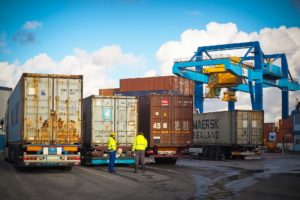
The Bureau of Customs (BOC) Post-Clearance Audit Group (PCAG) has so far issued 307 audit notification letters (ANL) to importers, most of which import rice and pharmaceutical products.
The third and latest batch of ANLs was issued to 121 importers last October 8, according to BOC assistant commissioner and PCAG head Atty. Vincent Philip Maronilla in a briefing to a Lower House Committee on Ways and Means meeting on November 27.
Maronilla said that of the 121 ANLs, 61 were issued to rice importers “to check compliance records of rice importers in lieu of the passage of the Rice Tariffication Law (RTL).” RTL, which took effect last March, liberalized rice importation.
Meanwhile, 14 ANLs were issued to importers of pharmaceutical products due to their significant royalty payments; nine ANLs issued to importers of mobile phones over the report by the Department of Finance on suspected undervaluation of mobile phone importations; and 37 ANLs to companies with track records of non-compliance with customs rules and regulations.
The first batch of 31 ANLs issued last January 8 comprised 26 Super Green Lane (SGL) importers while five were importers with track records of non-compliance with customs rules and regulations.
The second batch of 155 ANLs focused “mainly on the effects of the TRAIN Law relevant to the magnitude of customs revenues, specifically excise taxes collected by the BOC,” Maronilla said.
The Tax Reform for Acceleration and Inclusion (TRAIN) Law, which took effect in 2018, has increased the excise tax on certain importable goods such as oil, tobacco, and alcoholic beverages.
The second batch consisted of 31 importers of motor vehicles, 21 importers of foodstuff and/or beverages with high fructose corn syrup, 12 importers of oil, seven importers of alcohol and tobacco products, 11 SGL importers, seven importers of steel, and 66 importers with track records of non-compliance with customs rules and regulations.
PCAG has also received 123 applications to the Prior Disclosure Program (PDP) as of November. PDP, formerly called voluntary disclosure program, is based on international best customs practice that allows importers to voluntary pay for discrepancies in duties and taxes of previous shipments before post-clearance audit.
Of the 123 applications, 68 were filed by companies currently undergoing audit; 20 with amendments to applications pursuant to Customs Administrative Order (CAO) 01-2019; and 35 filed by companies not being audited by PCAG.
CAO 01-2019 implements the post-clearance audit function and PDP of BOC, pursuant to the Customs Modernization and Tariff Act (CMTA). The post-clearance audit, formerly called post-entry audit, was returned to BOC in 2016 after the function was transferred to the Department of Finance in 2014.
Maronilla said PCAG has already generated P2.136 billion of revenue from PDP, of which P1.993 billion have already been collected. He noted that this has already surpassed the highest collection of P950 million in 2007 by the previous Post Entry Audit Group by 155%.
Maronilla earlier said PCAG was on track to hit its internal revenue target of P4 billion this year.
Under CAO 01-2019, within three years from the date of final payment of duties and taxes or from customs clearance, BOC may conduct an audit examination, inspect, verify, and investigate records pertaining to any goods declaration, which includes statements, declarations, documents, and electronically generated or machine-readable data.
Such audit intends to ascertain the correctness of the goods valuation and determine the liability of the importer for duties, taxes, and other charges, including fine or penalty. – Roumina Pablo
